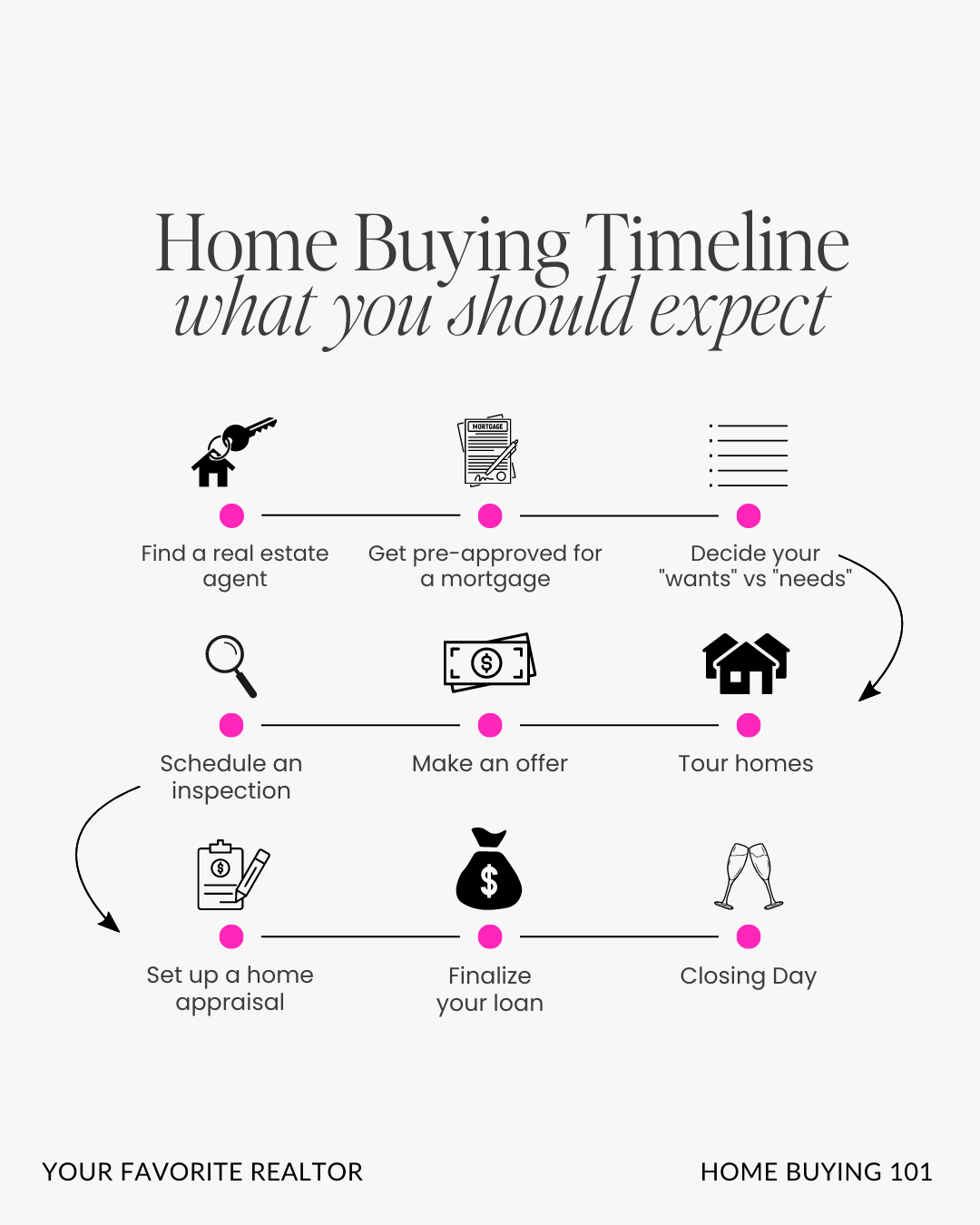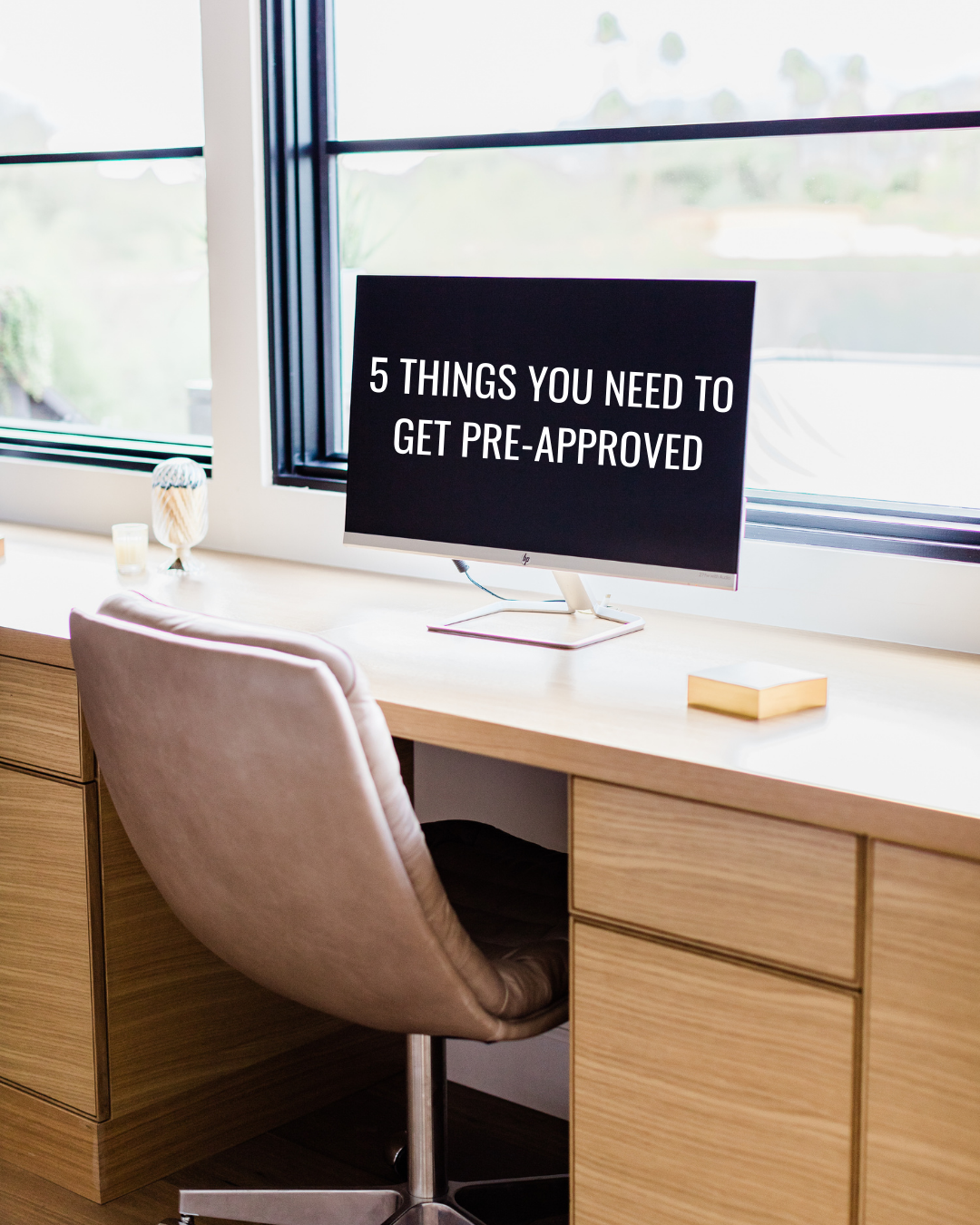Blog > Home Buying Timeline, 5 Things to get Pre-Approved, Wants vs Needs, Questions at Home Showings, How to get an Accepted Offer, and Home Valuation vs Home Appraisal.
Home Buying Timeline, 5 Things to get Pre-Approved, Wants vs Needs, Questions at Home Showings, How to get an Accepted Offer, and Home Valuation vs Home Appraisal.
by

Let’s talk about home buying.
I’m going to tell you what I always tell my buyers: be prepared for the process to take longer than you expect, but be ready to move quickly anyway!
Here’s what the typical steps in a home purchase look like:
1) Find a real estate agent
2) Get pre-approved for a mortgage
3) Determine your wish list and outline “wants” vs “needs”
4) Tour homes that interest you
5) Make an offer on “The One”
6) Schedule a home inspection
7) Set up the home appraisal
8) Finalize your loan
9) Closing Day
On the quick end of things buying a home could be your reality in as little as 10 weeks. I’m ready if you are — DM me and let’s get started!

Don’t skip this crucial step!
Today, we’re talking all about the pre-approval process, which determines what homes you can afford.
What does it mean to be pre-approved?
It means that a certified mortgage lender has checked your credit, employment, and verified assets.
Once they’ve reviewed these things, they can tell you how much money the bank can loan you for your mortgage.
Also, most sellers require a pre-approval letter from a mortgage lender before negotiating with a buyer.
In order to get pre-approved, you’ll need to provide proof of:
Employment verification
Proof of assets (cash on hand; the money in your checking or savings accounts, money market accounts, etc.) Proof of income (income tax returns)
A qualifying credit score (usually above 620)
Personal documentation (government-issued identification)
Once you’re pre-approved, we can begin the home-buying search in earnest!
Drop a “YES!” in the comments if you found today’s lesson helpful. I think I covered the basics, but if you have any questions, feel free to shoot me a DM if you have questions.

Okay, friend. It’s time for some tough love: let’s chat about *wants* vs. *needs.*
In a perfect world (and in a perfect market) you’d be able to get everything on your home wish list.
But the reality is, that rarely happens.
That’s why it’s important to determine your wants and needs *before* you begin your home search. This way, you don’t waste your time viewing homes that don’t work for you or your family.
But what’s the difference between the two?
*Needs* are your must-haves. Your non-negotiables. Your can’t-live-withouts.
Examples include air conditioning, enough bedrooms for each member of your family, and location (think: within a certain school district or within a certain radius of your job)
*Wants* are more like things you can live without, but would prefer to have, such as quartz countertops, hardwood flooring, or a separate shower and bathtub.
The thing about your list is that it’s personal to *you.* Your best friend might need a big backyard for her Great Dane, while you might want a smaller yard that doesn’t require a ton of maintenance
So, let’s practice. Share some of your home wants and needs in the comments below!

I want to take a moment to be honest with you…
Home buying can be really overwhelming!
You’re making the biggest financial decision of your life and sometimes, you have to make it within the 15-minute window of a showing or open house.
That’s why when I accompany my clients to showings, I encourage you to spend time getting to know the property and deciding if it checks enough of your boxes, while I focus on making sure we ask the important questions:
Logistical:
-Why is the homeowner selling?
-When does the seller want to move?
-How long has the property been on the market?
-Are there any other offers on the property?
Property-Related:
-Has the seller made any major updates to the property?
-How old are the appliances, roof and heating/cooling systems? Are they in good condition?
-Have there been any foundational issues?
-Has the sewer ever backed up?
-Have there been any leaks or water damage in the property?
Local:
-What are the property taxes?
-How much do utilities typically cost?
-What is the school district? (even if you don’t have kids in the schools, this impacts resale!)
Bonus Tip: Don’t let yourself get distracted by the seller’s home decor! You’re not buying that Pottery Barn sofa, you’re buying the foundation, the floor plan and the structure.
Save this post in case you find yourself spontaneously popping into an open house this spring and remember, I’m always just a phone call or text away!

This step is a big one!
Once you’ve found “the one,” it’s time to write a killer offer.
Because you’ve followed all of my previous steps, writing a great offer won’t be hard!
You have a pre-approval letter in hand, you’re represented by an agent who is dedicated to help you succeed, and you have thought carefully about your needs and wants.
Once you find a home that checks all of your boxes, we’re ready!
Even though the market has shifted and conditions aren’t as competitive for buyers as they were a year ago, sellers still have room to negotiate and it’s possible that your offer won’t be accepted right away.
So here three tips I give my home buyers when it comes time to write a great offer:
1) Be prepared to be flexible. Buyers do have some negotiating power back, but it’s still important to consider what the seller might be looking in terms of earnest money requirements, timeline, and closing date. I’ll always do my best to glean as much information as possible from the listing agent, but flexibility is often key!
2) Partner with your lender. The reason that cash offers are usually more appealing to a seller is because without a financing contingency, it’s a lot less likely that the deal will fall apart. Sometimes an enthusiastic endorsement from a loan officer (via email or even in a video message to the seller’s agent) can reassure the seller that your financing is secure.
3) Consider an escalation clause. If there are multiple offers (and yes, that does still happen, despite what you might hear in the news!) an escalation clause tells the seller that you will pay $X above the highest bid to have your offer accepted.
Questions about submitting a winning offer? I’ve got the answers and my inbox is always open.

Raise your hand if you know the difference between a home valuation and a home appraisal
(And, it’s OK if you don’t! Because I’m here to help you).
First, let’s talk about appraisals.
If you’re financing your home with a mortgage (as opposed to paying cash), you’ll want to be sure to negotiate a home appraisal contingency into the sales contract.
A home appraisal is a process through which a real estate appraiser determines the fair market value of a home.
It can assure you and your lender that the price you’ve agreed to pay for a home is fair.
(Appraisals are also often used to determine property taxes, which makes them a requirement in most counties).
The appraisal contingency protects you because if the appraisal comes in too low to justify the agreed-upon purchase price, then you can walk away from the deal without penalty or renegotiate the terms of the deal with the seller.
The market value of a property is decided by the buyer of a property, based on what they think the price of a property should be and, most importantly, what they are willing to pay for it.
Oh — and here’s a bonus tip! A home appraisal is not the same as a home inspection. Yes, the appraiser does assess the home’s condition, but only for the purposes of arriving at a valuation.
Questions about market value. vs. appraised value? Drop me a message anytime and I’d be glad to answer them!

